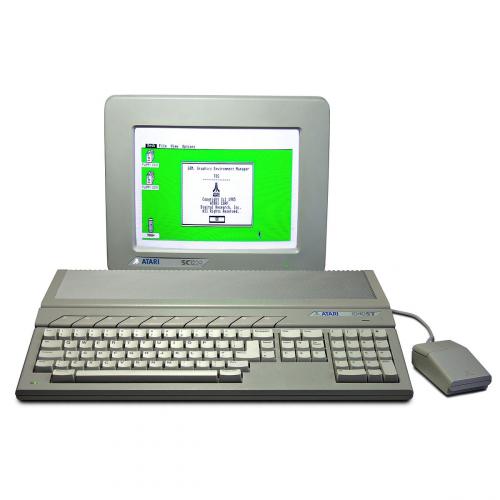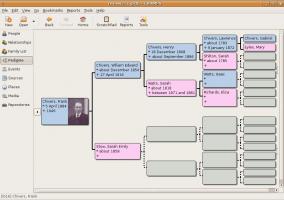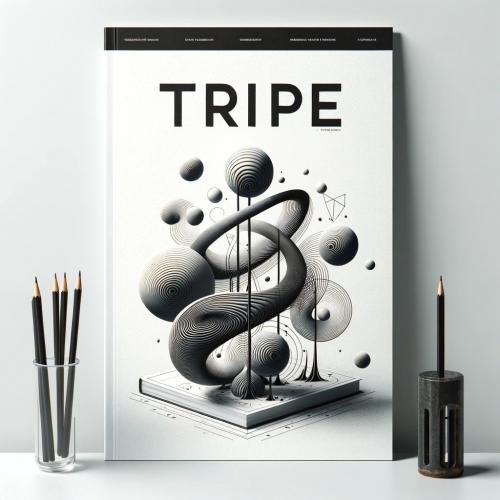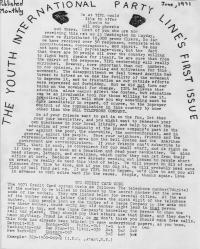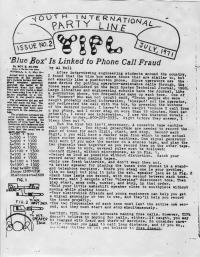Copy Link
Add to Bookmark
Report
Palantir Issue 2

/**[Palant¡r]************************************************[Issue #2]**/
ÜÜÜÜÜ
ÜÜßßß ßßßÜÜ
ÜÜ Üß ÜÜ
ßÜ Üß Û Ü
ßßÜ ßÜ Û Üß
ÜÛÜÜ Ü Û Û ÜßßßÜ ÜßßßÜÛ
Û Üß ÜßßßÜÛ ÜßÜßÜ Û ß ÜßßÜ Û
Üß Û Û Û Ûß Û Û Üß Û Û Û Û ÜÛ
Û ÜßßÜÜÜßÜß ßÜÜÜßßÜß ßÜß ßÜÜÜßßÜß
Û ßÜß ßÜßßÜß Û Üß Û
Ü finrod Û Û The DemOS
Project Newsletter Û Û Û Released:
30/01-1996 Issue #2 ßÜÜ ÜÜß ß
ßßßÜÜÜÜÜßßß
Your favourite editor is of course Beren of Ewox and comments are
welcome at beren@infolink.no
/************************************************************************/
There will be a time where most PCs are killed by Bill Gates' children in
the Windows family. There will be a time, where all the major companies
who're making the decisions of what will be and what won't will kneel to
the ground and sing 'God save the Gates' or something. It's very much
like that today, you know. But everyone who has read Asterix knows that
there is this very little minority of people who won't obey Microsoft's
rules, who stand up against this huge, multinational corporation. We're
them! Our Operating System, 100% MS-free, is being built. Slowly, a whole
new nation is growing, it's land is every computer it has reached, it's
citizens are all demo-enthusiast. Slowly, we're increasing in strength.
And while the old-fashioned Microsoftprogrammers slowly retire, the new
OS is growing... and growing... What do you turn to when you realize that
even Gravis do more and more Windows? Installing DemOS in progress...
/**[Contents]************************************************************/
1. What is this?
1.1 General info
1.2 Dist sites
1.3 Submissions
1.4 Related information
2. What's new?
2.1 Crew
2.2 WWW-pages and Cdrom.com
3. Current status
3.1 More people are welcome to join
3.2 More dist sites are welcome
3.3 Groups
3.4 The boot process
3.5 The File System
3.6 Are any alpha versions available yet?
4. New/Modified ideas
4.1 Music support
4.2 Plug and Play
5. Closing words
/**[End of Contents]*****************************************************/
/**[1]****[What is this?]***************************************[Beren]**/
/**[1.1]**[General info]*************************************************/
Palant¡r is a newsletter which will be released on monthly basis. Its
purpose is to keep you up to date about The DemOS Project.
The DemOS will be a new Operating System which has only one main purpose:
To run demos at the best performance possible at your home computer. As
much of the computer resources as possible are laid at the coders feet.
The only limit is your computer and your imagination.
/**[1.2]**[Dist sites]***************************************************/
Palant¡r is distributed at the following sites, groups and BBS'es:
http://www.ifi.uio.no/~dag-erli/demos/newsltrs.html
http://www.skolesjefen.oslo.no/skole/persbraten/
hjemmesider/demos/newsltrs.html
ftp: /ftp.cdrom.com/demos/info/DemOS/
news://comp.sys.ibm.pc.demos
Bulletin Board Systems:
-----------------------
Norway
Doriath BBS (Ewox WHQ)
Phone: (+47) 22491249
Speed: 28k8
SysOp: Beren
Infolink BBS
Phone: (+47) 22571600 / (+47) 22571604
Speed: 14k4 (4 nodes) / 28k8 (6 nodes)
SysOp: Gunnar Johnsen
Portugal
The Hotpoint
Phone: (+351 1) 9575245
Speed: 28k8
Sysop: Captain Hook / Pedro Correia
Switzerland
The Hotpoint
Phone: (+41) 31 952 7817
Speed: <no info>
SysOp: Cyberpunk
/**[1.3]**[Submissions]**************************************************/
If you'd like to leave an article about your view on The DemOS Project,
about a feature you'd like to have included or (if you're inside the
project) about how thing's are going, what's new or anything at all which
might be of interest of the readers of Palant¡r, please send it to
beren@infolink.no, and we'll include it in our next issue. Until then!
/**[1.4]**[Related information]******************************************/
Seems like we didn't manage to put up a subscribe-server for Palant¡r
this month either. But there WILL BE! (some time...)
/**[2]****[What's new?]*****************************************[Beren]**/
/**[2.1]**[Crew]*********************************************************/
Since we launched the project officially, several people have joined us,
which is quite fortunate since we need people in this project. What we
still need is people who want to make specific programs and utilities.
That's i.e. WWW-browsers, IRC-clients and stuff like that, it's offliners,
music-players, trackers, painting programs and graphical converters, it's
editors, it's shells, it's even games. If you've made ANYTHING and want
to port it to DemOS, contact us and we'll provide you with any information
you'd need.
/**[2.2]**[WWW-pages and Cdrom.com]**************************************/
Since last issue, we've set up our pages at cdrom.com for non-European
people. See dist sites paragraph 1.2. If you have experienced the slow
ftp-server at cdrom.com, note that the WWW-server is *FAST*! :-)
/**[3]****[Current status]***********************************************/
/**[3.1]**[More people are welcome to join]*********************[Beren]**/
Even though we have already got quite a few people involved in this The
DemOS Project, more people are welcome to join. More people can speed up
the coding, detection of bugs and help us create the OS so that it will
suit more people. If you're interested in joining us, please mail me at
beren@infolink.no
/**[3.2]**[More dist sites are welcome]*************************[Beren]**/
When the first issue of Palant¡r was out, several people contacted me
and wondered if their boards could be distribution sites for Palant¡r
and The DemOS Project. Certainly: The more boards the better. This will
increase peoples knowledge about it and make it more welcome than it will
if we just release it without more fuzz. So if you want your board or
ftp-site to distribute what-ever is publicly released, fill out this form
and send it to beren@infolink.no
Board name:
Country:
Phone number:
FTP address:
Telnet address:
Speed:
SysOp:
and I will include it on your list. Note that only the people who do this
will be official dist sites. Unofficial distribution is not prohibited,
but I would prefer people to contact us.
/**[3.3]**[Groups]**********************************************[Beren]**/
We've divided the entire project into smaller groups. Each group has its
leader who is free to divide the group into subgroups at need. The groups
operating at present are:
Group (Leader) Who's in the group?
----------------------------------------------------------------------
Kernel (Token) Token, Finrod
Graphic Subsystem (Erise) Erise, Inferno, Jestyr, Clef
/**[3.4]**[The boot process]************************************[Token]**/
Hi folks, I am Token and Beren urged me to write some lines concerning the
boot process for this Palant¡r issue... ;).
Well, then.. DemOS (or whatever we'll call it on release) can be booted
from floppy diskette as well as from fixed disk. The guy who takes care of
most of the booting stuff is called OSLO (OS Loader) and resides in a
7.5K contiguous area right after the boot block. Our little boot-slave :-)
is loaded and invoked by the boot sector code on a floppy disk or by the
master boot record on a fixed disk (also via the root partition's boot
sector...). If installed on a harddisk, OSLO will behave as a boot manager
allowing the user to select the partition he wants to boot from.
Otherwise it will simply load the kernel. OSLO does not need a separate
partition (as does the OS/2 bootmgr) but uses space on the DemOS root
partition (just as LILO). OSLO runs in protected mode (I'll use gcc to
write it) so that the bootsector code is switching to protected mode
before invoking OSLO. The OS Loader will use a v86 task to communicate
with BIOS. You don't need to use OSLO as a boot manager (although it will
be compatible with Linux, OS/2 and DOS/Win95). It will then behave as if
booted from floppy diskette (i.e. loading the kernel). Ok, now to give you
a quick overview what has already been done: Boot sector is done, loads
correctly and switches to protected mode. The OSLO virtual 8086 interface
is almost completed so that OSLO itself should be done in a week or so.
Hmm, well, that was it IMHO.. For further questions just ask *me* :-). Uhm
btw, I'm developing under Linux so if you've got any questions about using
gcc/gas to code for this project, feel free to ask.
/**[3.5]**[The File System]**************************************[Mage]**/
The design of the file system has been completed, except for a couple of
implementation details. The design will provide a fast and efficient way
to access files, and data. This is done, by using a combination of
addressing schemes. No, FAT, is not one of them! In fact the design more
resembles UNIX - FS meets OS/2 - HPFS. The directory structure will
consist of BTrees. Since BTrees are fast, efficient and lend themselves
very well for what was needed, they were the obvious choice. For those of
you that do not know what a BTree is, it is basically much like a binary
tree, except that instead of having only two branchs it has multiple
branchs. Because of the complexity of BTrees, it is impossible to
implement a DOS-like deletion. So, to provide a means to undelete items,
some other method has to be used. It has been mentioned to use a trashcan
sort of method, where items are not immediately deleted, but instead kept
in a trashcan list, and are only raped when needed or after a specific
amount of time has passed. I would like to here comments on this, so if
you do have a comment, please feel free to write me.
Speaking of comments I have another item that I would like peoples
opinion on. This has to do with how you want different partitions to be
handled. Do you want drive letters (as per DOS), or would you prefer
having more of a UNIX like method of handling multiple partitions. Again,
for those that are not familiar with the UNIX method, it basically makes
all partitions, and physical drives look like one big directory tree,
since drives are mounted into a particular directory. This directory is
not special in any way, and does not appear any different to the user than
any other directory. Either method can be implemented into the file
system, but I would like to hear what you (the potential user) has to say!
Now onto some boring numbers about the address space of the file system.
There essentially is no limit as to how big a partition, or a particular
file can be. The only limit there is, is because of the use of 32 bit
pointers for block addresses. This gives a 2^32 possible block addresses.
If the block size is 4096 bytes then you can address a total of:
2^32 * 4096 = 1.759218e+13 bytes or 16,777,216 Megs
Using the indexing scheme of addressing blocks, a file can grow up to
9 + 1024 + 1048576 + 1.073741e+09 = 1.074791e+09 blocks
So, again if we used 4096 bytes blocks, the total bytes that can be
addressed is:
1.074791e+09 * 4096 = 4.402345e+12 bytes or 4,198,404 Megs
This is only if a file does not happen to be contiguous. If the file is
contiguous, then the entire address space can be addressed by any file,
using the other addressing scheme, that is within the file system. There
are two different addressing schemes because, one is better suited toward
disjointed, non-contiguous files, whereas the other is better suited
toward linear or contiguous files. To keep track of all used/free blocks
the file system will use bitmaps. The bitmaps will be spread out across
the disk. Each bitmap will "service" a set of blocks, and will reside in
the middle of the blocks that they service. This will reduce the seek time
that is needed if a bitmap is not already in a buffer and needs to be read
in.
Since this was to be a general overview, I have purposely left out a lot
of specifics. A more detailed description will be available later, when
some of the open concerns have been resolved. I will note that the
implementation has already begun, and is coming along. Again if there are
any question or comments, feel free to contact me at:
bhanks@sunfse.ese.lmsc.lockheed.com
/**[3.6]**[Are any alpha versions availble yet?]****************[Beren]**/
Sorry, it's just been a month since we launched The DemOS Project and we'd
need some more time. But, if you want to prepare your computer for the OS,
you can reserve an own partition of approximate 50 MB (ought to be enough
for anybody! ;))) Well, at least to start with! :-) )
/**[4]****[New/Modified ideas]**********************************[Beren]**/
/**[4.1]**[Music support]************************************************/
Since the last issue of Palant¡r, Impulse Tracker has been released and
with it the IT-format. Because IT has a good environment and has less
major bugs than Scream Tracker, I think many of those currently making
S3Ms will soon switch to IT (at least I did). That's why we'll support
the IT format just like MOD, S3M, XM and Earth Tracker's.
/**[4.2]**[Plug and Play]************************************************/
Right... let's talk about dreams other places. Of course, it wouldn't be
that hard to implement, but then again, if you want to use Windows '95,
why don't you just do that? Plug and Play would require more time to
start the OS, take some of the performance away from the OS and with it
the demos, take us a lot of work which no-one would ever thank us for
and make if we wanted to do Bill Gates then... well, you get the point!
Plug and Play my ass!
/**[5]****[Closing words]***************************************[Beren]**/
Then the second edition of Palant¡r is finished. Thank you for reading
and I hope you're interested in this project. We're creating our own
tomorrow right now. I do look forward to use this system. :-)
I
must apologise very much for the last issue which was released
containing the QuickSilver 1376 virus, also known as Quicky. The infected
version was withdrawn very fast and a new one was distributed. I hope as
little people as possible were affected by my mistake. Thanks to Gunnar
Johnsen, SysOp at Infolink BBS, the mistake was discovered within 24
hours and corrected.
And I'd like to apologise on behalf of Finrod for a bug in ERead
concerning Sound Blaster cards. I haven't been able to test other sound-
cards to see if this bug continues, but there seems to be a little
conflict between ERead and Midas which doesn't give you any more music
on a Sound Blaster card other than a pop. :-I If you see any more bugs,
please contact Finrod at dagsm@infolink.no
Yeah, about ERead, there are things which Finrod wanted me to say. ;)
First of all, ERead has gone through some rather hard changes since our
last issue. I guess that's why the damn thing doesn't play a single tone
of the music with a GUS when using QEMM. And, the it still won't use the
Sound Blaster. If anybody has a clue or anything, contact Finrod at
finrod@infolink.no As the editor of this mag, I find it rather annoying
that so many people won't be able to have ERead use it's full potential.
(And of course, if we needed a list-program, we might as well have used
LIST. :) )
I'm very sorry for the poor ASCII in this issue, which is the same as in
our last issue. But no graphics made it in time. I actually delayed the
deadline while waiting for some ASCII which should come by SNAILMAIL
because WhiteWater's modem is down, but it looks like the post services
are a bit slow since he sent it a couple of days ago. :-( Anyhow, I hope
there will be somewhat better ASCII in our next issues.
Oh my, oh my... I nearly forgot again. For your information, I (Beren)
made then music in this issue and the last issue of Palant¡r. I noticed
that I had forgotten to take the credits for it in the last issue, so...
Anyway, the tune for this issue is just a sweet little bass-tune which has
no purpose but to make you feel good while reading this text. :)
Oh, yeah, some people have complained about not being able to rip the
tune from the previous issue. It's an MM-file put in with PackIt (an Ewox
product, of course :) ) I guess you guys will just have to wait for your
favourite ripper to support PackIt. :)
Until the next issue of Palant¡r, then! :-)
/************************************************************************/
______ ___ ____ ____ _____
/ ___/ /| / / / __ \ / \ / __/
/ / / | / / / / / / / /\ / / /
/ /_ / |/ / / / / / / / / / / /_
/ __/ / / / / / / / / / / / / __/
/ / / / / / / / / / / / / /
/ /_ / /| / / /_/ / / \/ / / /
/____/ /_/ |__/ /_____/ \____/ /__/
____
/___/
__ ___ ___ ________ ___ ___
/ \ / | / / / | /| / / /__ __/ / / / \
/ /\ | / | / / / | / | / / / / / / / // |
/ // / / O | / / / O | / |/ / / / / / / // /
/ __/ / _ | / / / _ | / / / / / / / / \
/ / / / \ | / /___ / / \ | / /| / / / / / / /| |
/__/ /_/ \| /______/ /_/ \| /_/ |__/ /__/ /__/ /__/ |__/
/**[End of Palant¡r]*****************************************[Issue #2]**/








